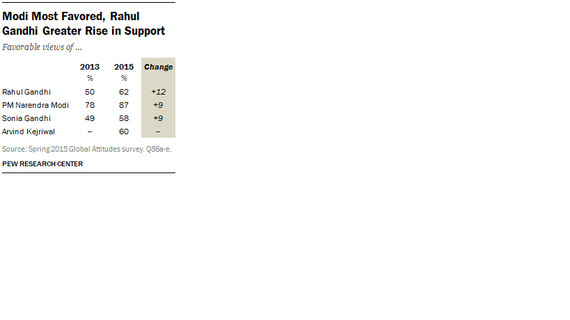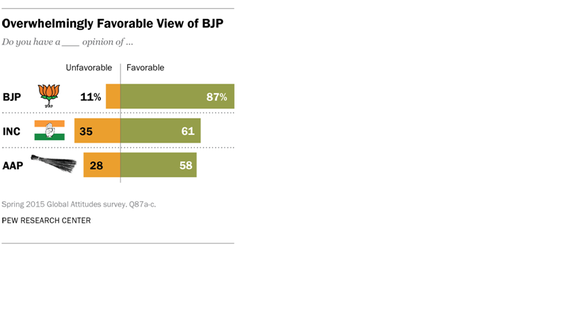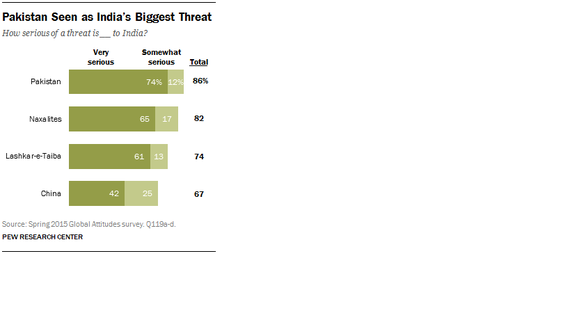The Pew Research Center, a nonpartisan American think tank, which conducts opinion poll on social issues, public opinion, media content analysis demographic trends shaping countries across the world and other empirical social science research, in its recent survey findings, released on 17th September 2015, probably to coincide with the Prime Minister Narendra Modi's birthday, shows emergence of Modi as the most popular political figure in India. The findings also show the unequivocal support he enjoys from the people of India on his handling of a variety of issues.
The survey show that under Modi's stewardship, 87% of the respondents felt more confident as compared to the cynicism, negativity, self-doubt and distrust of politicians experienced during the earlier Congress regime. In a surprise finding, Modi enjoys enormous popularity in rural India, which has been traditionally a Congress bastion.
Indians' pride in their country has grown from 72% in 2014 to 85% in 2015. Ever since Modi became the international face of India, 39% of the respondents felt the country's stature on the world stage has improved.
![2015-09-24-1443063851-4494794-Modimostfavoured.png]()
In 2013, only 29% of Indians were happy with the direction of their country which has now gone up to 56% expressing satisfaction. And this approval of the overall trajectory of the nation is shared across party lines, generations and gender. One of the reasons for the rise in satisfaction levels is the growth of the economy. However, the respondents were concerned with the growing crime rates, increase in terrorist activities, the problem of Naxalism, unemployment, air pollution, to name a few.
The findings also show the rising popularity of Rahul Gandhi and Arvind Kejrival. In fact, Rahul Gandhi's ratings have gone up by 12% over the 2013 figures.
Among the political parties in India, 87% of the respondents viewed BJP favourably. This may be, probably, because of Modi's incorruptible image, his personal charisma and ability to connect with ordinary people. AAP also got support from 58% of the respondents, again, probably, due to the clean image of Arvind Kejriwal.
![2015-09-24-1443064036-9345795-Untitled.4png.png]()
The survey, however, raises a few red flags. On India's relations with its neighbours, only 25% of the respondents were pleased with the way his government handled the India-Pakistan relations. There was also a growing feeling that Pakistan, as compared to China, poses a greater threat to India. The Indians also expressed concern with the prevailing situation in Kashmir, especially the northwest border region between India and Pakistan. In order to diffuse the tension with the neighbour, Indians favour talks between the two countries to end the stalemate. Only 39% of the respondents approved of the prime minister's handling of relations with China, and 37% with Russia. On India- US relations, 66% of the respondents gave thumbs up on his US diplomacy.
![2015-09-24-1443064109-3620368-Paksitanseenasathreat1.png]()
One of the major drawbacks of the survey results is its sample size. It has interviewed only 2452 respondents, a very small sample size, which can hardly be determined as a representative sample for a large country like India.
Earlier this year, Michael E. Porter, the Harvard Business School professor, along with Scott Stern of MIT and Michael Green, have devised a Social Progressive Index (SPI) for creating a robust and holistic measurement framework for national, social and environmental performance to benchmark success and accelerate progress. As per their study, India falls under "Low Social progress". India, it has been ranked 110, SPI of 53.06 and GDP of a mere $5238. Even countries like Thailand, Indonesia, Sri Lanka and Nepal have fared better than India when it comes to the Human Development Index.
The findings show that the economic growth has lifted hundreds of millions out of poverty and improved the lives of many more over the last half century. Yet it is increasingly evident that a model of development based on economic progress alone is incomplete.
Mr. Modi should take advantage of the tremendous goodwill the people have shown on his leadership. The time has come to push for big bang reforms if he wants to India to be a serious contender to be amongst three leading economies of the world by 2025. Further, as revealed in the Potter's survey, he should give equal emphasis on both growth and social progress. Only emphasizing on 'Growth,' at the cost of Social progress, will only promote inequality.
The countries that had a high GDP per capita also fared well in the social progress index. The results have shown a strong correlation between economic growth and a wide variety of social indicators, supporting Amartya Sen's economic model that countries should give equal focus to both development and social progress, for not only bridging the inequality gaps, but also for creating a stable and just society.
The survey show that under Modi's stewardship, 87% of the respondents felt more confident as compared to the cynicism, negativity, self-doubt and distrust of politicians experienced during the earlier Congress regime. In a surprise finding, Modi enjoys enormous popularity in rural India, which has been traditionally a Congress bastion.
Indians' pride in their country has grown from 72% in 2014 to 85% in 2015. Ever since Modi became the international face of India, 39% of the respondents felt the country's stature on the world stage has improved.

In 2013, only 29% of Indians were happy with the direction of their country which has now gone up to 56% expressing satisfaction. And this approval of the overall trajectory of the nation is shared across party lines, generations and gender. One of the reasons for the rise in satisfaction levels is the growth of the economy. However, the respondents were concerned with the growing crime rates, increase in terrorist activities, the problem of Naxalism, unemployment, air pollution, to name a few.
The findings also show the rising popularity of Rahul Gandhi and Arvind Kejrival. In fact, Rahul Gandhi's ratings have gone up by 12% over the 2013 figures.
Among the political parties in India, 87% of the respondents viewed BJP favourably. This may be, probably, because of Modi's incorruptible image, his personal charisma and ability to connect with ordinary people. AAP also got support from 58% of the respondents, again, probably, due to the clean image of Arvind Kejriwal.

The survey, however, raises a few red flags. On India's relations with its neighbours, only 25% of the respondents were pleased with the way his government handled the India-Pakistan relations. There was also a growing feeling that Pakistan, as compared to China, poses a greater threat to India. The Indians also expressed concern with the prevailing situation in Kashmir, especially the northwest border region between India and Pakistan. In order to diffuse the tension with the neighbour, Indians favour talks between the two countries to end the stalemate. Only 39% of the respondents approved of the prime minister's handling of relations with China, and 37% with Russia. On India- US relations, 66% of the respondents gave thumbs up on his US diplomacy.

One of the major drawbacks of the survey results is its sample size. It has interviewed only 2452 respondents, a very small sample size, which can hardly be determined as a representative sample for a large country like India.
Earlier this year, Michael E. Porter, the Harvard Business School professor, along with Scott Stern of MIT and Michael Green, have devised a Social Progressive Index (SPI) for creating a robust and holistic measurement framework for national, social and environmental performance to benchmark success and accelerate progress. As per their study, India falls under "Low Social progress". India, it has been ranked 110, SPI of 53.06 and GDP of a mere $5238. Even countries like Thailand, Indonesia, Sri Lanka and Nepal have fared better than India when it comes to the Human Development Index.
The findings show that the economic growth has lifted hundreds of millions out of poverty and improved the lives of many more over the last half century. Yet it is increasingly evident that a model of development based on economic progress alone is incomplete.
Mr. Modi should take advantage of the tremendous goodwill the people have shown on his leadership. The time has come to push for big bang reforms if he wants to India to be a serious contender to be amongst three leading economies of the world by 2025. Further, as revealed in the Potter's survey, he should give equal emphasis on both growth and social progress. Only emphasizing on 'Growth,' at the cost of Social progress, will only promote inequality.
The countries that had a high GDP per capita also fared well in the social progress index. The results have shown a strong correlation between economic growth and a wide variety of social indicators, supporting Amartya Sen's economic model that countries should give equal focus to both development and social progress, for not only bridging the inequality gaps, but also for creating a stable and just society.